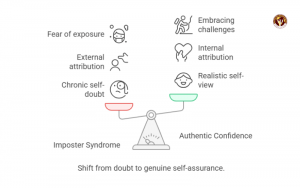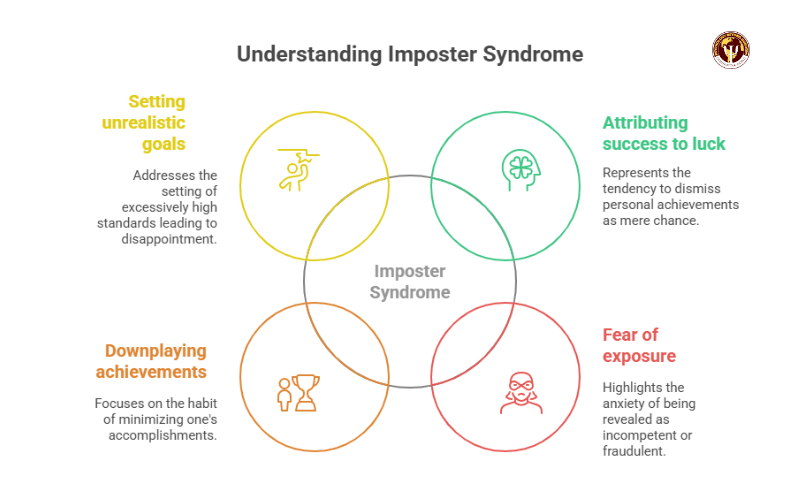Have you ever questioned your achievements, attributing them to luck rather than your own abilities? Felt like a fraud, fearing that others will “find out” you’re not as competent as they think? These are classic signs of imposter syndrome – a pervasive sense of self-doubt despite evident success. But what is the opposite of imposter syndrome? It’s not arrogance or overconfidence; it’s authentic self-assurance, a grounded belief in your own worth and capabilities.
At Citizen of the World, we delve into this transformative concept, exploring how understanding the opposite of imposter syndrome can lead to genuine confidence. We’ll examine the psychological underpinnings of these feelings, the unconscious processes that fuel them, and practical strategies to overcome them. Through the lens of psychodynamic psychotherapy, we’ll uncover how delving into our inner world can help dismantle these self-limiting beliefs and foster true self-awareness.

Understanding Imposter Syndrome
Imposter syndrome is a psychological pattern where individuals doubt their accomplishments and have a persistent fear of being exposed as a “fraud.” Despite evident success, those experiencing imposter syndrome often attribute their achievements to luck or external factors rather than their abilities.
Common signs include:
- Chronic self-doubt
- Overworking to compensate for perceived inadequacies
- Fear of being “found out”
- Difficulty accepting praise [1]
These feelings can lead to anxiety, depression, and hindered personal and professional growth.
When we talk about Imposter Syndrome, we often focus on the doubt, the fear, and the sense of not belonging. But rarely do we ask:
“If I don’t want to feel like a fraud… then what should I feel like?”
Contrary to what some might think, the opposite of imposter syndrome isn’t arrogance or inflated confidence. It’s not pretending you know everything, or walking into every room feeling invincible.
The true opposite of imposter syndrome is something quieter but more powerful:
Authentic self-confidence.
This is the kind of confidence that doesn’t need to shout or seek approval. It’s grounded. It’s internal. It’s built on real self-knowledge, not performance. Let’s explore what it actually looks like.
– Recognizing and Accepting Your Abilities
Authentic confidence begins with being able to see yourself clearly—not through the lens of your doubts, but through reality. You’re able to say, “Yes, I did that well” without deflecting praise. You acknowledge your skills without inflating them, and you own your mistakes without letting them define you.
– Maintaining a Realistic Self-View
You don’t need to be the best to feel worthy. People with authentic self-confidence accept that they are a work in progress. They hold space for both competence and imperfection. They don’t crumble at criticism, nor are they addicted to praise. They operate from a stable sense of who they are, not from constantly needing validation.
– Embracing Challenges Without Fear of Exposure
Where imposter syndrome sees every new opportunity as a threat—“What if they realize I’m not good enough?”- authentic confidence sees it as growth:
“This will stretch me. I may stumble, but that doesn’t change who I am.”
You may still feel nervous or uncertain, but you no longer interpret that feeling as proof of fraudulence.

Authentic Confidence is Quiet, Not Loud
It’s not performative. It doesn’t always feel bold or flashy. Instead, it shows up in subtle ways:
- You apply for the job you want, even if you’re scared.
- You receive praise and say “Thank you,” without apologizing.
- You make a mistake and still believe you belong.
- You stop comparing your insides to someone else’s outsides.
In short, it allows you to walk through life without the constant fear that you’re about to be exposed as a fraud. It lets you live and grow as your whole, imperfect, and entirely worthy self.
Developmental Background and Unconscious Influences
Our early life experiences significantly shape our self-perception. Factors contributing to imposter syndrome include:
- Family dynamics: Growing up in environments with high expectations or inconsistent feedback can lead to internalized beliefs of inadequacy.
- Cultural and societal pressures: Societal norms and cultural expectations can instill feelings of not measuring up.
- Unconscious processes: Defense mechanisms, such as denial or projection, may mask true feelings of self-doubt.
These unconscious patterns can persist into adulthood, influencing how we perceive ourselves and our achievements.
Why Do I Feel Fake?
That quiet, uncomfortable feeling, like you’re just pretending, and at any moment someone will “find out” — isn’t uncommon. You’re not alone in asking: “Why do I feel fake, even when I’ve worked hard to get here?”
This sensation doesn’t come from a lack of skill, but often from internalized beliefs that whisper: “You’re not enough.”
Even when reality tells another story, your inner voice may keep you stuck in doubt. Let’s break down why this happens.

1. Perfectionism
You might set impossibly high standards for yourself. Anything short of perfect feels like failure. So even when you succeed, it doesn’t feel “real”—just “not yet enough.”
2. Fear of Failure
When failure feels like exposure, you’re constantly on guard. You may fear that one slip-up will reveal you as a fraud, even though failure is a normal part of growth.
3. Constant Comparison
In a world of curated success stories, it’s easy to feel less-than. You compare your real, messy, human self to someone else’s highlight reel—and conclude you’re falling short.
But Here’s the Truth:
Feeling like a fraud doesn’t mean you are one.
It means your internal map may have been drawn with outdated stories—stories from childhood, past criticism, or unrealistic expectations. They’ve shaped how you see yourself, often unfairly.
These feelings are often signals, not facts. Signals that your self-image and your real-life achievements are out of sync. And acknowledging that misalignment is powerful—it’s the first step in rewriting those old scripts.
Are You Even Good Enough to Have Imposter Syndrome?
It’s a paradoxical question, but many high-achievers wonder if they’re “worthy” of experiencing imposter syndrome. This self-doubt can be a sign of humility and self-awareness. Recognizing that these feelings are common and not indicative of actual incompetence is crucial.
Do I Have Imposter Syndrome? A Quick Quiz
Consider the following questions:
- Do you attribute your success to luck or external factors?
- Do you fear being exposed as a fraud?
- Do you downplay your achievements?
- Do you set excessively high goals and feel disappointed when you fall short? [2]
If you answered “yes” to most of these, you might be experiencing imposter syndrome.
Practical Strategies to Overcome Imposter Syndrome
- Acknowledge Your Feelings: Recognize and accept your imposter feelings without judgment.
- Reframe Negative Thoughts: Challenge and replace self-defeating thoughts with positive affirmations.
- Celebrate Achievements: Keep a record of your accomplishments to reinforce your self-worth.
- Seek Support: Talk to mentors, peers, or therapists about your experiences.
- Set Realistic Goals: Establish attainable objectives to build confidence through small wins.
The Role of Psychodynamic Psychotherapy
Psychodynamic psychotherapy delves into unconscious processes and past experiences to understand current behaviors and emotions. It’s particularly effective in addressing imposter syndrome by:
- Uncovering Root Causes: Exploring early life experiences that contribute to self-doubt.
- Identifying Defense Mechanisms: Recognizing patterns that protect against perceived inadequacies.
- Enhancing Self-Awareness: Gaining insight into unconscious motivations and behaviors.
- Fostering Authenticity: Encouraging the integration of all aspects of the self for a cohesive identity.
Through this therapeutic approach, individuals can develop a deeper understanding of their imposter feelings and work toward lasting change.

Conclusion
So What Is the Opposite of Imposter Syndrome? It’s authentic confidence, rooted in self-awareness, not perfection. Overcoming imposter syndrome means understanding its underlying causes and shifting deep, often unconscious, patterns. Psychodynamic psychotherapy helps guide that process, offering a path toward real, lasting self-assurance.
Psychological Support Services
At Citizen of the World, we are committed to supporting your mental well-being. Our range of psychological services is designed to address various emotional and psychological challenges, helping you navigate life’s complexities with resilience and self-awareness.
- Healing Shame
- Couple’s Communication
- Anxiety and Anger Management
- Premarital Counselling
- Feelings of Worthlessness and Hopelessness
- Splitting
- Narcissism
- Psychological Assessment
- Grief and Loss
- Self-Esteem
For more information or to schedule a consultation, please visit here: citizenoftheworld.international.
[1] lifeintelligence.io+1fermatapsychotherapy.com+1
[2] https://en.wikipedia.org/wiki/Control_mastery_theory

